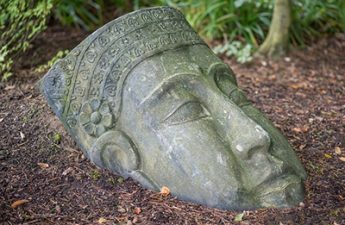 Part 1 and Part 2 of this little series lead in to this foundational question: Is mindfulness/meditation an Eastern religion practice or not? With its use in schools, businesses, and psychologists’ offices, it tends to be billed as neutral. Sometimes, though, the Eastern-ness is cheered, and (it had to happen!) you also sometimes hear of “Christian mindfulness.”
Part 1 and Part 2 of this little series lead in to this foundational question: Is mindfulness/meditation an Eastern religion practice or not? With its use in schools, businesses, and psychologists’ offices, it tends to be billed as neutral. Sometimes, though, the Eastern-ness is cheered, and (it had to happen!) you also sometimes hear of “Christian mindfulness.”
This Huffington Post article insists that all Eastern-ness has been removed for us here in the West. But this Wisdom Publications piece hints that the real power in the practice is its Eastern religion basis.
To sidetrack for a minute: I was given a book that appears to be a collection of quotes on mindfulness. We have to realize that when things become trendy, opportunistic people take advantage of the chance to make a buck. Some of the quotes in this book aren’t about mindfulness at all but more of the “A stitch in time saves nine” variety. And some of the people quoted don’t have a clue as to what mindfulness is. Of the quotes that remain, I can separate the “mindfulness” quotes into two categories: (1) ideas that are actually borrowed from the Bible—but without crediting the Bible and (2) ideas that go against the Bible. Examples:
BORROWED FROM THE BIBLE
“Do not encumber your mind with useless thoughts. What good does it do to brood on the past or anticipate the future?” (Dilgo Khyentse Rinpoche). The Scripture more clearly proposes this idea in Matthew 6:25-34 (“your heavenly Father knows [what] you need”); Philippians 4:12, 13; Colossians 3:2.
“Compassion means that you automatically restrain yourself from any thought, word, or deed that might harm yourself or others” (Bhante Henepola Gunaratana). See Zechariah 7:9, 10 (“show mercy and compassion to one another”); Matthew 6:12; Colossians 3:12-14.
AT ODDS WITH THE BIBLE
“We too should make ourselves empty, that the great soul of the universe may fill us with its breath (Laurence Binyon). See Acts 13:52 (“the disciples were filled with joy and with the Holy Spirit”). Also some interesting Scriptures about “empty” and “full”: Isaiah 2:6; 59:4; Ephesians 3:19; 5:6.
“No one can help us as much as our own compassionate thoughts” (Buddha). See 2 Chronicles 14:11 (“Lord, there is no one like you to help the powerless against the mighty”); Isaiah 41:10; Psalm 16:7, 8; 18:3-18; 2 Timothy 3:16, 17.
“The present moment is filled with joy and happiness” (Thich Nhat Hanh). All present moments? Really? See John 16:33 (“in this world you will have trouble”); Romans 8:35-39.
That’s just a sampling. Since everyone can go straight to the Scripture for the Lord’s perfect teaching, there’s no need to go looking elsewhere. But worse, ultimately, is that mindfulness—being rooted in a false religion—aims to lead away from the true God, who is the true source of true wisdom, true peace, true love, and true power.
Back to our main point: There’s a big difference between a practice that’s completely neutral/nonreligious (like working a puzzle or watching the hummingbirds) and one that IS religious. What concerns me are the pagan practices that we are naïve about…and even try to sanitize into Christian practices. This, instead of starting with the Lord’s practices in Scripture.
Part 1 of this series said that people have been naïve about these practices. That’s understandable among certain people. But Christians are supposed to know how the enemy traps us, and we’re to be alert to his schemes. I suggest you read this series again. Do an hour or two of research—including flipping randomly in the Old Testament to…well, to any page! Because you’ll most likely land on a warning about false religion. There’s a clue.
To conclude all this: Let’s be aware of the big picture. And if schools intend to keep religion out of the classroom, let’s help them be consistent.



Because these people are demonically led, they are masters at masking terms, hiding motives and using neo-orthodox words to deceive. I offer two explanations as examples, drawing from the comments above– the “Against the Bible Category,” noting that after depositing deceptive words, they pervertedly cite Scripture completely out of context:
“Do not encumber your mind with useless thoughts. What good does it do to brood on the past or anticipate the future?” (Dilgo Khyentse Rinpoche). The Scripture more clearly proposes this idea in Matthew 6:25-34 (“your heavenly Father knows [what] you need”); Philippians 4:12, 13; Colossians 3:2.”
In Buddhism, one is taught that there is no past or future, only the moment of “Now” at the present. Now, if that’s true, how am I resounding to an articles written weeks ago? If theres is now future, why did they write? There’s nothing for anyone to learn tomorrow and it’s already too late to stop what fictitiously happened yesterday! This is nonsense. Secondly “useless thoughts” (for advocates of this demonic spirituality) , are ANY thoughts, but especially, BIBLICAL thoughts (like Scripture). The goal in these meditations is to EMPTY the mind of ALL thought, and thus the reports of people losing their sense of self and identity or the needs of others. The quote from Matthew 6 is so far out in left field, I can’t even make a logical connection for them citing it except that they advocate for a soft social gospel to replace the preaching of the Gospel (Rom.1:16, 17).
Finally, this quote: “Compassion means that you automatically restrain yourself from ANY thought, word, or deed that might harm yourself or others” (Bhante Henepola Gunaratana), (capital emphasis mine). How is it that emptying your mind of ALL thought, is “compassionate?” When one renders themselves thoughtless, demonic spirits begin to implant the thoughts THEY want in your head. (read 1Tim.4:1-2). Pastor Greg Allen